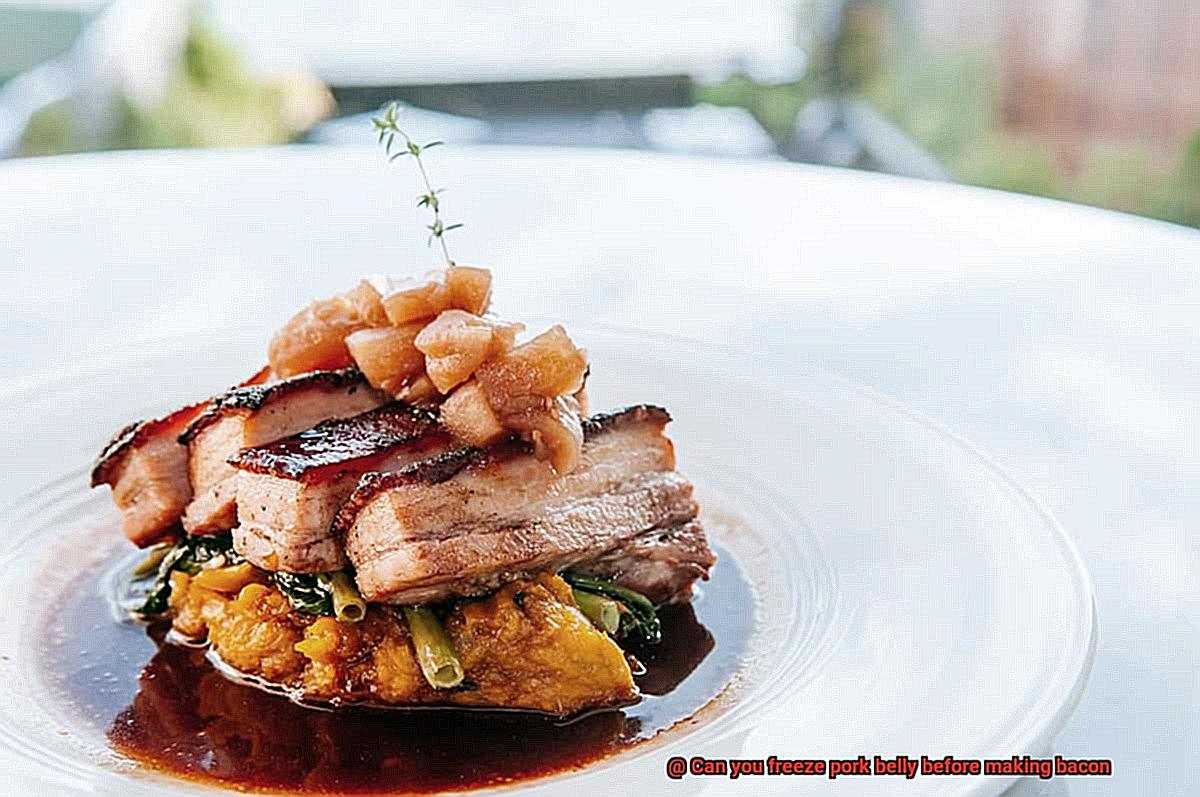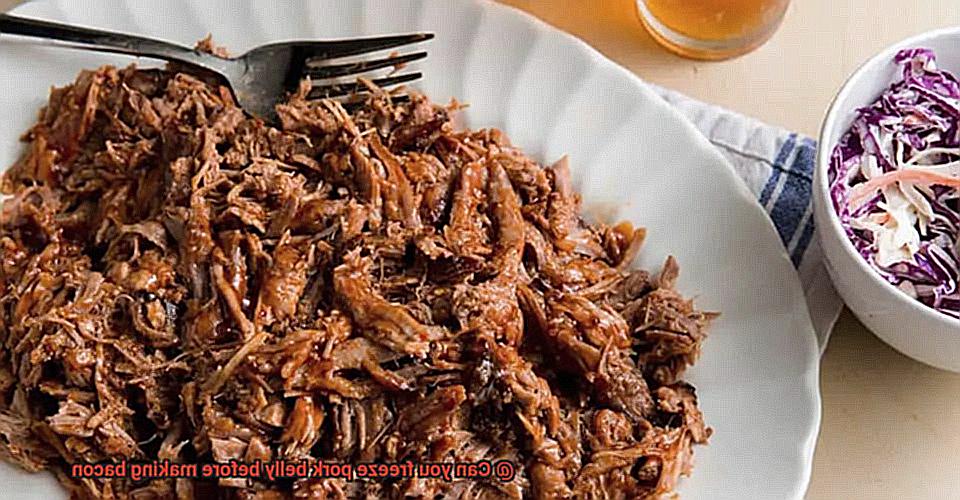Do you dream of savoring the crispy goodness of homemade bacon, but have more pork belly than you can handle? Or perhaps life has gotten in the way, and you need to put your bacon-making on hold. Fear not, fellow bacon enthusiasts. The question on everyone’s mind is whether or not it’s possible to freeze pork belly before making bacon.
Pork belly is a versatile and flavorful ingredient that’s used in many dishes. Its tender meat and rich taste make it a popular choice for those who love to cook. However, not everyone knows how to store it properly or if freezing it will affect its quality. When it comes to making bacon, freezing the pork belly may seem like a convenient solution, but does it compromise flavor?
In this blog post, we’ll explore everything you need to know about freezing pork belly before making bacon. We’ll cover essential topics like how long it can be frozen for, how to store it correctly, and whether or not freezing affects the final product’s quality. Plus, we’ll share expert tips on making mouth-watering homemade bacon using fresh or frozen pork belly.
So get ready to sharpen your skills and discover all there is to know about freezing pork belly for perfect homemade bacon every time.
Contents
What Is Pork Belly?
Look no further than pork belly, the fatty underside of a pig’s belly that has become a beloved ingredient in cuisines around the world.
Pork belly’s high-fat content makes it perfect for slow cooking, resulting in tender and juicy meat with a rich flavor. It’s a versatile cut that can be used in many dishes, but its most famous iteration is undoubtedly bacon. To create this breakfast favorite, pork belly is cured with salt and other seasonings before being smoked to perfection.
But what if you have leftover pork belly from your bacon-making endeavors? Can it be frozen for later use? The answer is yes, but proper storage is key. When freezing pork belly, wrap it tightly in plastic wrap or aluminum foil to prevent freezer burn, which can cause the meat to become dry and lose its flavor.
When you’re ready to use your frozen pork belly, make sure to thaw it properly by transferring it from the freezer to the refrigerator and allowing it to thaw slowly and evenly overnight. With these tips in mind, you can ensure that your pork belly dishes are always flavorful and succulent.
It’s important to note that fresh pork belly has a short shelf life and should be cooked within a few days of purchase. However, frozen pork belly can last for several months if stored properly. So whether you’re making bacon or experimenting with other pork belly dishes, understanding this versatile cut of meat and how to store it properly will help take your culinary creations to the next level.
Why Freeze Pork Belly?
For good reason. Freezing your pork belly can lead to better texture, flavor, and safety in your final product.
Let’s start with texture. When you freeze your pork belly, it firms up, making it much easier to slice. This is especially important if you’re looking to create perfectly uniform strips of bacon using a meat slicer. The firmness of the meat allows for cleaner, more consistent slices, resulting in picture-perfect bacon every time.
But that’s not all. Freezing your pork belly can also help infuse more flavor into the meat. When you freeze meat, ice crystals form and puncture cell walls, allowing for deeper absorption of marinades or seasonings. This means that if you season or marinate your pork belly before freezing, those flavors will be more deeply infused into the meat. Imagine biting into a strip of bacon that’s bursting with flavor – that’s what freezing can do.
Now let’s talk about food safety. Freezing your pork belly can help kill any potential parasites or bacteria that may be present in the meat. This is particularly important when making bacon at home, as improper curing or smoking can result in botulism or other foodborne illnesses. By freezing your pork belly before starting the curing and smoking process, you’re taking an extra step to ensure that your final product is safe to eat.
How to Freeze Pork Belly
Pork belly is a versatile cut of meat that can be used to create a variety of dishes, from succulent bacon to flavorful stews and roasts. However, if you have more pork belly than you need or want to save some for later, freezing it is an excellent option. Here are the steps involved in properly freezing pork belly:
Choose High-Quality Pork Belly
The first step in properly freezing pork belly is to choose high-quality meat. Look for pork belly that is fresh, without any signs of discoloration or spoilage. This will ensure that your meat stays fresh and tasty even after being frozen.
Trim Excess Fat and Skin
Before wrapping your pork belly for freezing, trim off any excess fat or skin. These can cause freezer burn and affect the texture and flavor of the meat once it is cooked. By removing them, you’ll help keep your meat in top condition.
Wrap Tightly
Wrap the trimmed pork belly tightly in plastic wrap or aluminum foil. This will help prevent freezer burn and keep moisture from escaping, which can cause the meat to become dry and tough. Be sure to label the package with the date of freezing and any other relevant information.

Use a Freezer-Safe Container or Bag
Choose a freezer-safe container or bag that is airtight and moisture-proof to prevent freezer burn. This will help keep your pork belly fresh and tasty until you’re ready to use it.
Freeze at 0 Degrees Fahrenheit or below
Store the wrapped pork belly in the freezer at a constant temperature of 0 degrees Fahrenheit or below. This will help ensure that the meat remains fresh and safe to eat for up to six months.
Thaw Slowly in Refrigerator
When you’re ready to use your frozen pork belly, thaw it slowly in the refrigerator. This helps prevent bacteria growth and preserves the quality of the meat. Avoid thawing the pork belly at room temperature, as this can allow bacteria to grow and cause foodborne illness.
Benefits of Freezing Pork Belly
Look no further than freezing your pork belly. Not only does it eliminate any harmful bacteria or parasites that may be present in the meat, but it also extends its shelf life, makes slicing easier, and saves you time on preparation day.
Let’s dive into the benefits of freezing pork belly before making bacon. Firstly, freezing meat at 0°F (-18°C) or below for a minimum of three to four weeks is known to kill any parasites or bacteria that may exist in the meat. This means you can enjoy your delicious bacon without worrying about any potential health risks.

In addition to ensuring safety, freezing pork belly also extends its shelf life for up to six months when stored properly in a freezer. This allows you to buy in bulk or use leftovers from previous cooking sessions, saving you money and reducing food waste.
But that’s not all – freezing pork belly can also make slicing easier and more efficient. By freezing the meat for a few hours, it becomes firmer and less prone to tearing or crumbling when sliced thinly and evenly. This is crucial for achieving that perfect bacon texture and flavor.
Last but not least, freezing pork belly saves you time on preparation day. You can freeze it in advance and thaw it out when you’re ready to use it, avoiding the need to wait for the meat to thaw before slicing and curing it. This means less hassle and more time to enjoy your delicious homemade bacon.
Drawbacks of Freezing Pork Belly
Before you do so, it’s essential to understand the drawbacks that come with freezing pork belly.
One significant drawback is the impact on texture. The fat in pork belly can become grainy and lose its smooth texture when frozen, affecting the overall quality of your bacon. This is something no bacon lover wants.
Another issue is freezer burn, which occurs when moisture leaves the meat and causes it to dry out. This results in tough, flavorless meat that’s not enjoyable to eat. Using plastic wrap or aluminum foil to wrap your pork belly tightly before freezing can help prevent this.
The curing process used to make bacon can also be affected by freezing. Freezing can slow down or even halt the curing process, causing unevenly cured bacon that may result in either too much or too little saltiness.
Finally, frozen pork belly may result in a loss of flavor due to the loss of natural juices and flavor. This means that your bacon may not taste as good as fresh pork belly.
Thawing Frozen Pork Belly
Before you get started, it’s crucial to know how to properly thaw your frozen pork belly. As a pork expert, I have compiled some essential research notes that will ensure your bacon comes out perfectly.
First off, it’s important to note that freezing pork belly changes its texture and moisture content. Therefore, proper thawing is necessary to avoid any issues during the curing process. You have two options when it comes to thawing frozen pork belly: in the refrigerator or using cold water.
The safest and most recommended method is thawing in the refrigerator. Simply place the frozen pork belly in a shallow dish or on a plate and let it sit in the fridge for 24 to 48 hours depending on its size. This method allows for a slow and even thaw, which helps retain the quality of the meat.
However, if you’re pressed for time, using cold water is an option. Place the frozen pork belly in a leak-proof plastic bag and submerge it in cold water. Change the water every 30 minutes until it is completely thawed. Keep in mind that this method should only be used if you plan on cooking or curing the pork belly immediately after thawing.
It’s crucial to never thaw pork belly at room temperature, as it can lead to bacterial growth and foodborne illnesses. Additionally, avoid using hot water or a microwave to thaw as these methods can cause uneven thawing and cook parts of the meat, which will affect its quality and texture.
To summarize, here are some key points to keep in mind when it comes to thawing frozen pork belly:
- Thaw in the refrigerator for a slow and even thaw
- Use cold water if you’re in a rush but plan on cooking or curing immediately after
- NEVER thaw at room temperature or with hot water/microwave
How Long Can You Keep Frozen Pork Belly?
To ensure optimal quality, proper storage and handling are essential. Wrap and seal your pork belly tightly to prevent freezer burn. Now, let’s dive into the question at hand.
Frozen pork belly can last up to six months in the freezer without any significant loss of quality. However, this time frame depends on a few factors.
Temperature is a major factor. If your freezer maintains a consistent temperature of 0°F (-18°C) or below, your pork belly can last up to six months with no issues. If the temperature fluctuates or rises above 0°F (-18°C), it can shorten the shelf life of your frozen pork belly.
Another important factor is how well you’ve wrapped and sealed your pork belly before freezing it. If air gets into the packaging, it will cause freezer burn and affect the meat’s texture and flavor. To prevent this, wrap your pork belly tightly in plastic wrap or aluminum foil before placing it in an airtight container or freezer bag.
While frozen pork belly can technically last indefinitely in the freezer, its quality will deteriorate over time. For best results, it’s recommended to use frozen pork belly within six months of freezing.
Tips for Making Bacon from Frozen Pork Belly
Making bacon from frozen pork belly can seem intimidating, but fear not. With a few helpful tips, you’ll be able to create delicious homemade bacon that will impress anyone who tries it.
Thawing the pork belly properly is crucial. It’s best to take the pork belly out of the freezer and place it in the refrigerator for at least 24-48 hours. This will allow it to thaw slowly and evenly without any bacteria growth. Once thawed, it’s important to keep the pork belly at a consistent temperature throughout the curing process. You can use a curing chamber or seal the pork belly in a plastic bag and place it in a cooler with ice packs.
Next, it’s time to season your pork belly with your desired mix of spices and seasonings. Be creative here. Some people like brown sugar, garlic powder, or smoked paprika for an extra flavor boost. Rub the seasonings onto both sides of the pork belly thoroughly and let it rest for several hours or overnight.
Before smoking your bacon, it’s important to make sure that the pork belly is completely dry. Pat it dry with paper towels or let it air dry for a few hours. When you’re ready to smoke your bacon, consider using a mild wood such as apple or cherry to allow the flavor of the bacon to shine through.
Remember that frozen pork belly will take longer to cure and smoke than fresh pork belly, so patience is key when making bacon from frozen pork belly. It may take up to two weeks for the curing process and several hours for smoking. However, once you try your homemade bacon, you’ll know it’s worth the wait.
_ngJ8nqZG3o” >
Conclusion
In conclusion, freezing pork belly before making bacon can be a game-changer for busy cooks. Not only does it extend the shelf life of your meat, but it also makes slicing a breeze. However, proper storage and thawing techniques are crucial to ensure successful curing.
To prevent freezer burn and maintain quality, wrap the pork belly tightly in plastic wrap or aluminum foil before placing it in an airtight container or freezer bag. Thawing should be done slowly in the refrigerator over 24-48 hours, but if time is of the essence, cold water can speed up the process.
It’s important to note that while frozen pork belly can last up to six months in the freezer without significant quality loss, texture and flavor may be affected. Freezing can cause fat to become grainy and natural juices and flavors may be lost. However, freezing also allows for deeper absorption of marinades or seasonings.
Making bacon from frozen pork belly requires patience as curing and smoking times may increase compared to fresh pork belly. But with proper seasoning and smoking techniques, you’ll end up with delicious homemade bacon that will impress even the pickiest eaters.
In summary, freezing pork belly before making bacon is a convenient option that requires attention to detail during storage and thawing.






